The Inglourious Basterds Kill Hitler and Other Wild Alternate Histories in Movies
History is filled with "what ifs" and "might have beens," but when it works, alternate histories can make for some grade-A big screen entertainment.
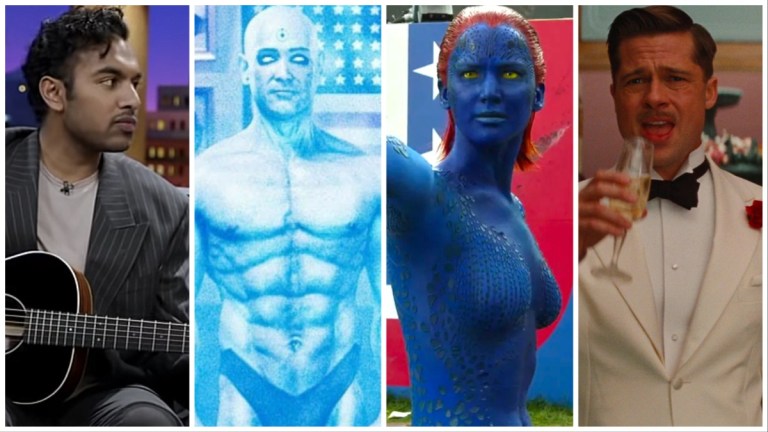
Alternate history is one of science fiction’s biggest niches, at least on the bookshelves. There’s some big winners out there, like when historian and author Harry Turtledove took us on a trip through a Civil War where mercenaries funneled modern weapons to the Confederates in The Guns of the South. Meanwhile David Drake has a joyful obsession with introducing Roman centurions to aliens everywhere from Birds of Prey to Ranks of Bronze. It’s a ton of fun to splash through a world of what could have been.
Movies dip their toes into the genre to a far lesser extent, frequently sticking with takes on a post-WWII era where the Axis forces take control. There’s some fantastic movies in that niche, although they’re not often happy rides. But there are some great, zany takes on mixed-up history that a film fan can miss if they’re not looking. These are movies that ride the butterfly effect like it’s a wild bronco, and aren’t afraid to show us a good time doing it.

Once Upon a Time… in Hollywood
Quentin Tarantino can be a divisive director for some, and a mystery figure for those who think foot fetishes are weird. But his love of movies is unimpeachable, granting Tarantino the zest to try something different, all for his heartfelt love of cinema history.
Leaving aside the Bruce Lee controversy, the biggest impact of Once Upon a Time… in Hollywood is how it asks us to imagine a future where the other most infamous moment of Roman Polanski’s life—let’s not sugarcoat, he drugged and raped a thirteen-year-old child—doesn’t hover over the industry. We get there via a bizarre romp with two less than heroic Hollywood creatures, failed actor Rick Dalton (Leonardo DiCaprio) and his murder-happy stuntman Cliff Booth (Brad Pitt), prevent the so-called Manson Family from murdering a pregnant Sharon Tate and her three friends on the night of Aug. 8, 1969. Do their wrongs create a future right? Could Sharon have saved Polanski from himself? And if the Manson murders had never occurred, would the cynicism that replaced the “summer of love” ‘60s optimism had so easily set into the culture?
These are tantalizing questions, ones that linger long after the bitter taste of the Bruce Lee fight fades.
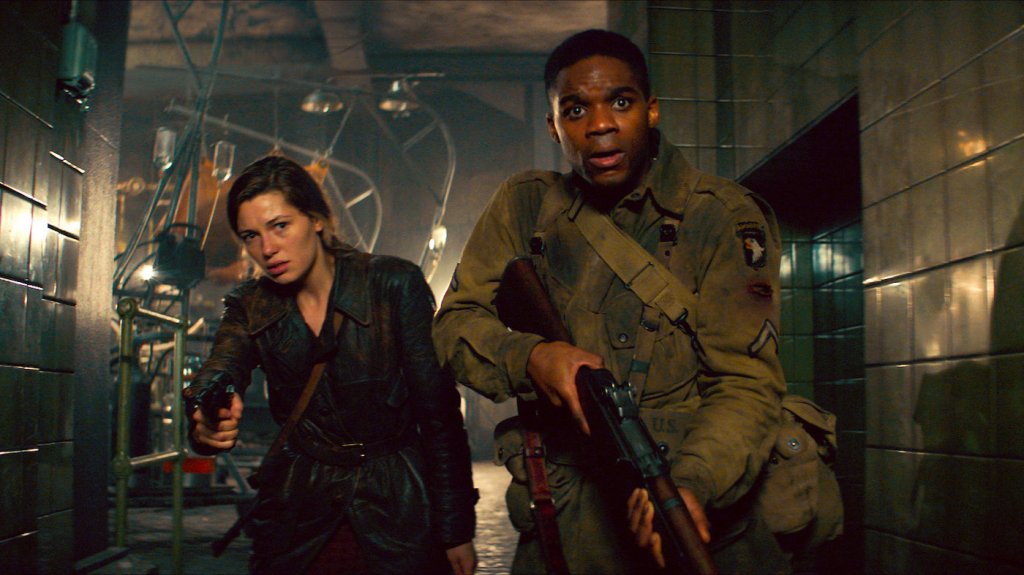
Overlord
There’s a slew of gripping alt-history takes on World War II, from the thoughtful 1994 TV movie Fatherland to the psychedelic nightmare of Philip K. Dick’s The Man in the High Castle. But Overlord, bless its black soul, goes in a wildly different direction in its efforts to remind us that it is always moral to fight Nazis.
The real life Nazi experiments perpetrated on innocent Jews and other “undesirables” are nothing to joke about, so Overlord is already tiptoeing close to dark territory. But by putting a D-Day prep crew on the ground in rural Germany, we dodge toying with the horrors of the Holocaust and instead fall into a gory Resident Evil gaiden where Nazi scientists are turning this bucolic town into their own Waschbar City, filled with the marauding undead.
There’s probably some neat metaphor about the black tar being brought up to fuel this mutative serum, like the sins of war turning us into monsters, blah blah. But there’s a scene where Euron Greyjoy (Pilou Asbæk) sticks Kurt Russell’s son Wyatt, who played Evil Captain America last year, on a meathook. Top tier entertainment.
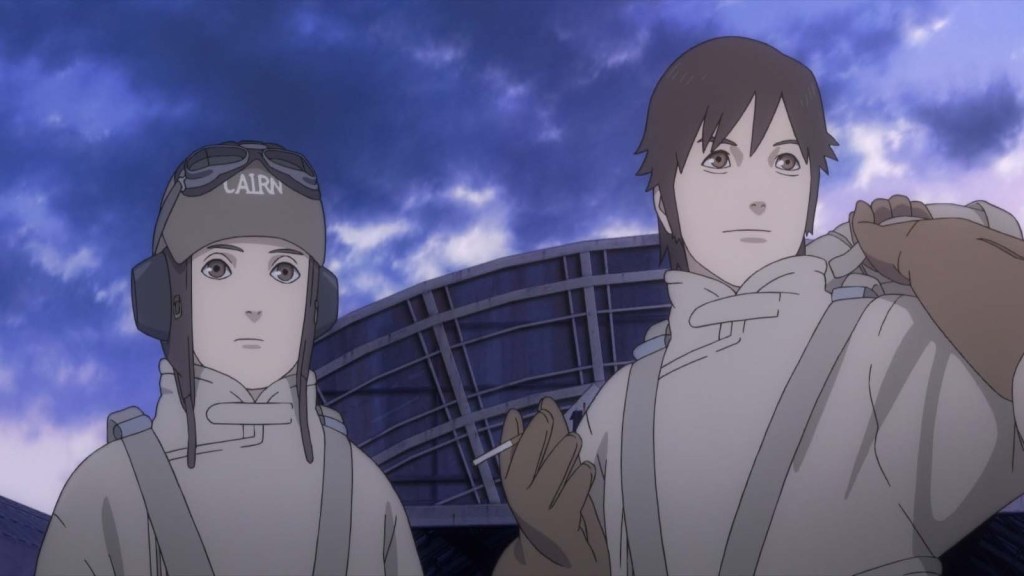
The Sky Crawlers
Say the name Mamoru Oshii to an anime fan and they know to brace themselves for excellent but harrowing entertainment. Oshii lives by the Hideo Kojima principle: War is hell, and its aesthetic can both haunt and grant awe. Stepping away from his best known Kerberos saga, Oshii brings to life author Hiroshi Mori’s The Sky Crawlers, a tale of an alternate history where war is unnecessary, but not the primitive desire to shed blood.
The military industrial complex has changed while the civilian world seems frozen in a post-WWI silence. No longer needing soldiers, countries farm out Kildren, expendable teenage pilots who play fatal wargames. Their bloody sacrifices ease whatever it is in us that requires violence, like Le Guin’s “The Ones Who Walk Away From Omelas” with private military corporations providing scapegoats for this utopia. Achingly pretty, with top notch aerial combat, it’s easy to be lulled into simply enjoying this film—until you remember this is a deeply screwed up metaphor for what we’re constantly doing to ourselves, and our troops.

Inglourious Basterds
Inglourious Basterds seems like a properly gonzo Dirty Dozen riff, with Tarantino playing with toy soldiers and rummaging around the European front of WWII for deliciously violent set pieces. With the Bear Jew (Eli Roth) and Lt. Aldo Raine (Brad Pitt) delighted to run around collecting Nazi scalps for the Allied cause, it’s already easy to enjoy this movie. It only gets better with the expertly tense narrative of Shosanna (Melanie Laurent) versus Hans Landa (Christopher Waltz). They all work so hard to take the Nazis down in 1944, that in the back of your mind you know it’s a shame they can never fully succeed.
And then Tarantino says, “Fuck it, we’re killing Hitler!” And he does. Suddenly, this pleasantly violent war movie becomes a wish-fulfillment alternate history fantasy of the highest order. Screw the butterfly effect historians fear in this scenario, to hell with worrying about what will replace the Fuhrer tomorrow. Right now, Hitler is dead, and we are loving it. Sorry if that’s a spoiler, folks, we call it a reason to rewatch this every time these right-wing Neo-Nazi dipsnots crawl out of their holes. Make killing Hitler great again!
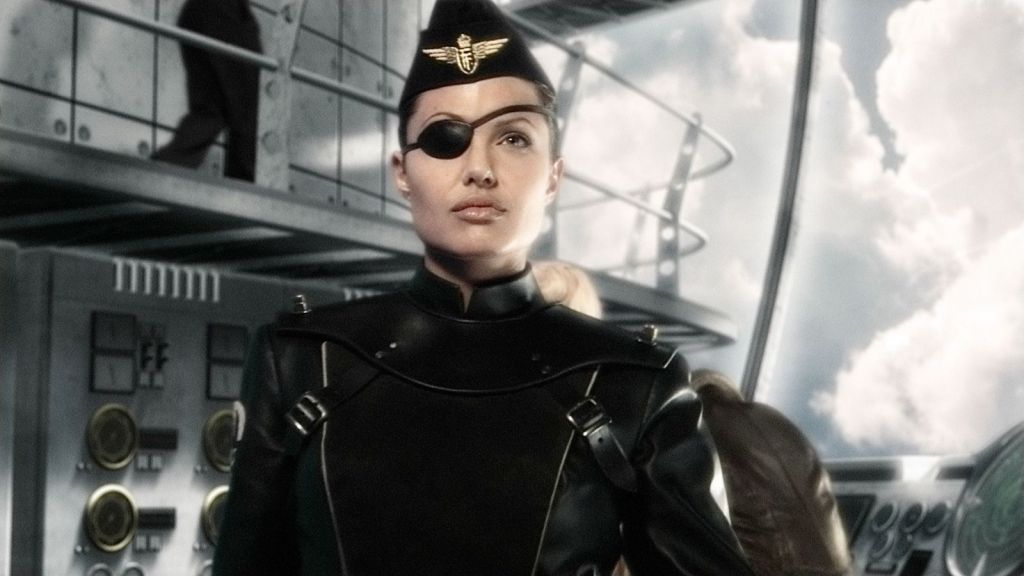
Sky Captain and the World of Tomorrow
If we want to be technical, Sky Captain and the World of Tomorrow is really the top pulp serial of some unseen alternate history that has to be way better than the one we got stuck with. What it offers us is a new world of delight, a look back at the year World War II began in a way that keeps hope in its heart, in a year where most of our hopes drained fast.
It’s gonzo stuff, and frankly, we’re still a little weirded out by the long deceased Sir Laurence Olivier’s role here. But this dieselpunk world of airships and goofy, Ghibli-style robots exists in a nigh-untouchable ether of cool, playing with its blue screen sets in a way that makes sense to our CGI-tired eyes. With the titular pulp hero, the Sky Captain himself (Jude Law) in the air, there’s a feeling that in this sort of world, Hitler and his malicious bootlickers won’t dare touch Poland once Sept.1 1 rolls around. It’s a nice dream.
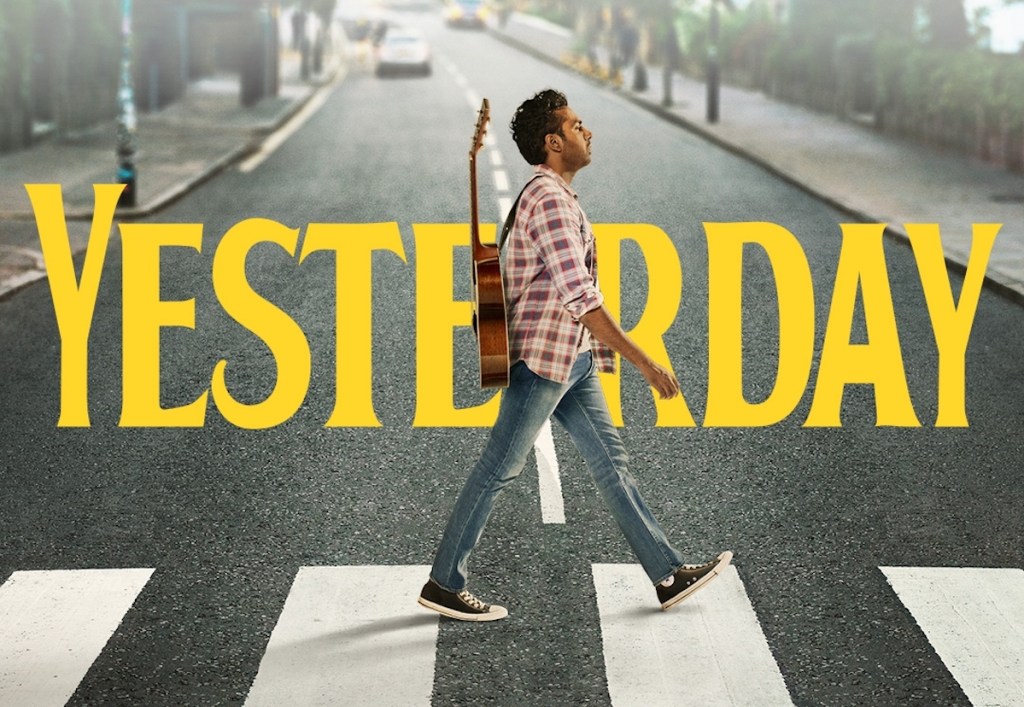
Yesterday
Whether you love the Beatles or just respect their massive impact on music history, it’s hard to imagine a world without them. So that’s exactly what director Danny Boyle does with Yesterday, a sweet-natured charmer that plays with its alternate history like a set of paper dolls. An unexplained global blip does a Thanos on the existence of the Liverpool lads as cultural phenomena—and a couple other things, too—and young Jack Malik (Himesh Patel) finds himself essentially the sole custodian of their legacy.
It’s not long before the film reveals its core theme to the audience, which is that the highest levels of fame suck so badly that it’s no wonder the original Beatles splintered off in attempts to find their own lives again. Jack figures this out quick enough to get a chance to decide his fate, whether to live as a person or as a capital C Celebrity. But the world does not change back with his choice, leaving us to ponder what other ripples exist in the flow of this peculiar time stream. Hopefully they still have HBO there, not whatever David Zaslav is doing to the service today.
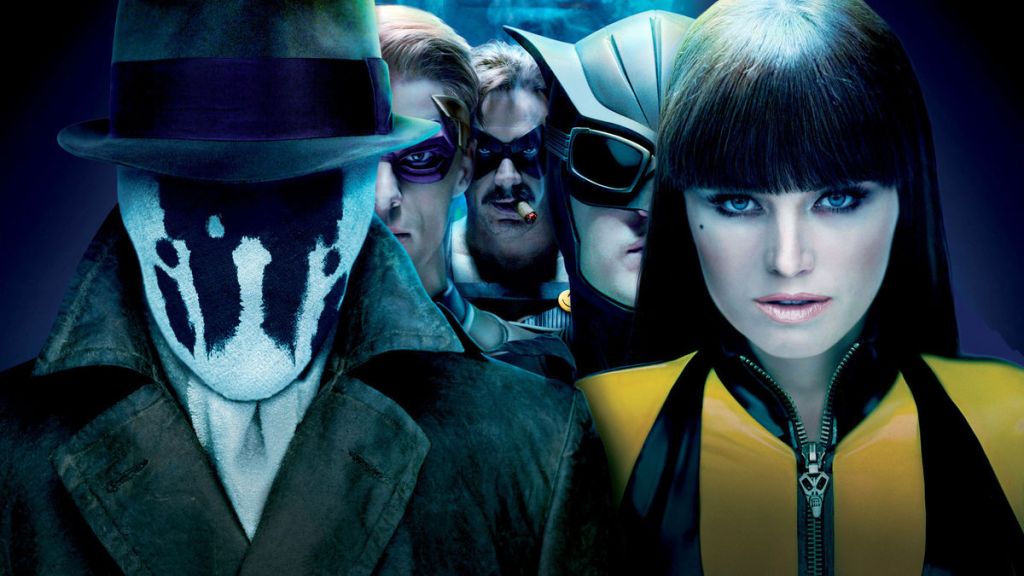
Watchmen
Alan Moore and Dave Gibbons’ seminal comic becomes a blindly faithful film adaptation, opening an argument that the movie falls into the precise nostalgic traps that the comic warned everyone about. But beyond the meta-commentary that drove Alan Moore deeper into the shadows of Northampton, Watchmen looks at a world where real costumed heroes sprang forth, inspired by the fictions of this altered time.
It’s a world where the Vietnam War ends with a literal deus ex machina as Doctor Manhattan (Billy Crudup) begins to grasp the impact his godlike superpowers will have on the future. It’s a world where the cynical Comedian (Jeffrey Dean Morgan) becomes a hired gun for conservative politicians, even assassinating presidents, until he comes up against a horrifying truth. It’s a world where control is exerted by always giving the people something to fear and attack—and here is where the real world truth of this alternate history hides. Not even our heroes are immune to the twin powers of nostalgia and hate. Power and corruption. Heroes, they’re just like us.
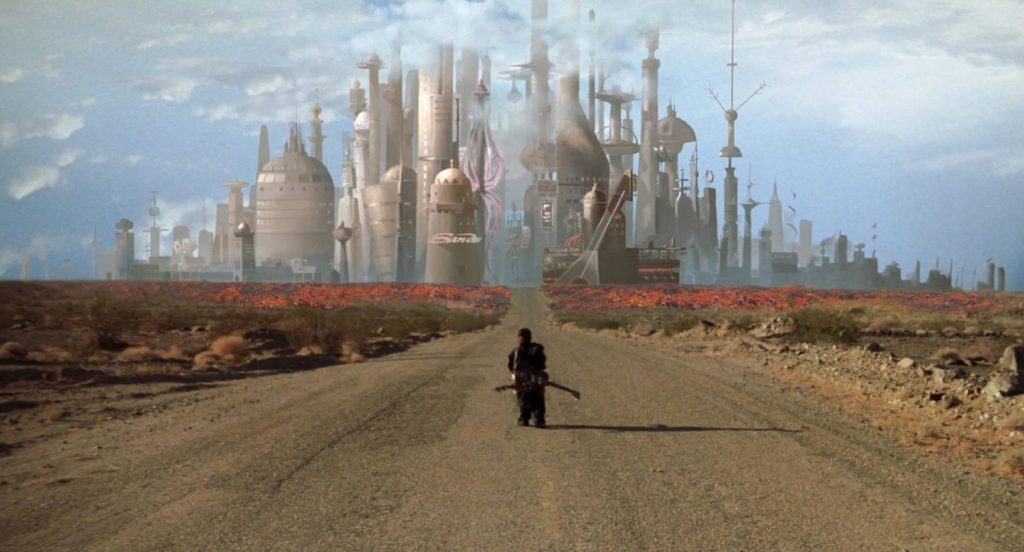
Six-String Samurai
Fans of Fallout: New Vegas, you owe it to yourself to find and watch a cult rarity named Six-String Samurai. This alternate history scenario will feel just like home. Here the nukes went flying in the bucolic ‘50s, and the remaining survivors live hardscrabble lives among the irradiated rubble. Las Vegas, now Lost Vegas, is one of the last strongholds in America, and King Elvis has reigned for 40 rocking and rolling years, dying in peace as the man that saved his people.
But Vegas needs a new ruler, and what we can only describe as the incarnated spirits of Buddy Holly, Slash, and Ritchie Valens are loose in the wastes. It’s Buddy that’s our hero, further adding a Lone Wolf and Cub by way of Mad Max flavor to the proceedings by taking a nameless Kid under his wing. It’s the sort of film best enjoyed with some medicinal help. We’re not kidding, by the way, you’re going to fire up your gaming system of choice to revisit New Vegas as soon as the credits roll. Hurry up before Starfield launches!
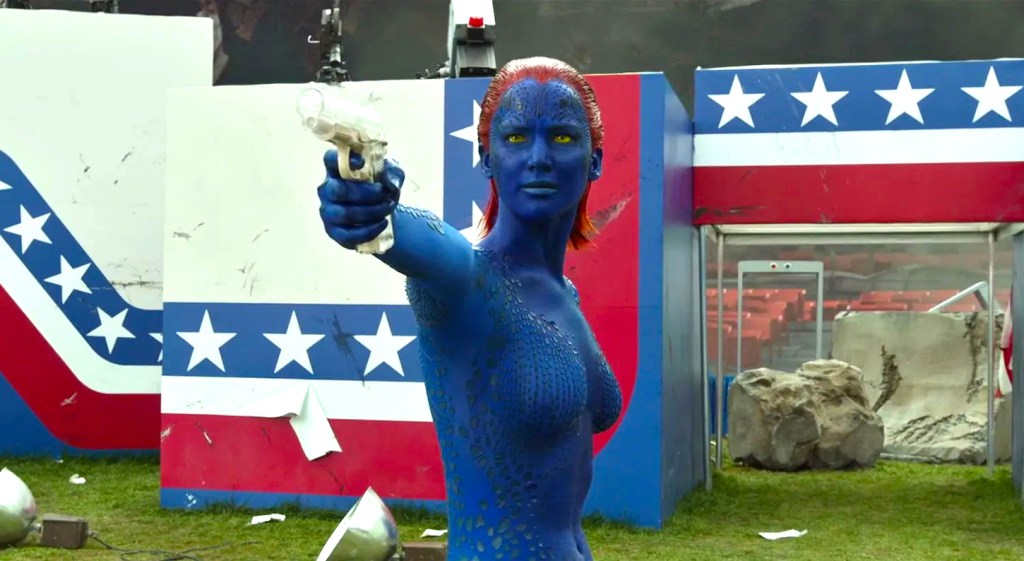
X-Men: Days of Future Past
Like Watchmen, but also very much not like that at all, the X-Men have to get to work preventing a Sentinel-ridden future by meddling with the past. Comic fans, yes, we’re still mad about sidelining Kitty Pryde in favor of Wolverine in this adaptation of a classic storyline, but when you’ve got Hugh Jackman and 30-plus years of Marvel overusing the ol’ Canadian shredder against you, it’s understandable.
It’s a timeline where Magneto (Michael Fassbender and Sir Ian McKellen, timeline depending) has seemingly killed JFK and is marinating in jail for it. The Vietnam War is at its peak, and Mystique (Jennifer Lawrence) is using the social and political chaos to get in close to the Nixon White House where she’ll assassinate the Sentinel program director Bolivar Trask (Peter Dinklage). It’s Magneto that gets it right once again, then, and instead arrives on the scene to target Nixon. There’s a bunch of other mishegas going on, and, to save the future, Nixon needs to survive. Come on, though. Let’s enjoy the moment. Without Nixon, there’s no Reagan. With no Reagan, there’s no decades of packing the Supreme Court just to screw us all now. Cue up Just Like Heaven by The Cure.
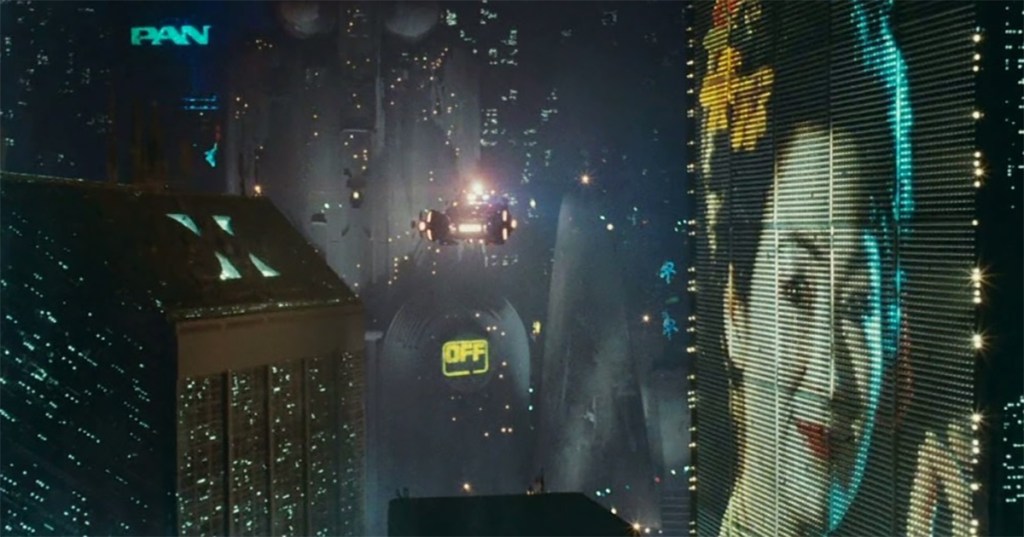
Blade Runner
Look, the original Blade Runner—and all its versions—takes place in 2019, and while it’s not technically an alternate history movie, it’s also a fact that 2019 didn’t look like that. So it’s worth a side mention that it’s Blade Runner 2049 which managed to predict today’s sepia-toned skies, for those of us enjoying the Canadian wildfires. But Blade Runner also suggests a lot had to have happened between its 1982 release date and its setting, almost all of which didn’t.
The classic sci-fi legend posits that we’ve already colonized space, gotten into space battles, and are shuffling people to off-world colonies for “better lives.” Oh, and the environment has gone to hell, necessitating synthetic solutions to these horrifying, man-made problems. It’s a zeerust world that never was, and the lessons of its alternate history remain as a warning to tell us to avoid what we can with the time we have left to us. But with billionaires doing their best to colonize space, militarized space forces gearing up, and desperate scientific attempts to normalize our environment, well, we’ll reconvene in 2049 to compare notes.
